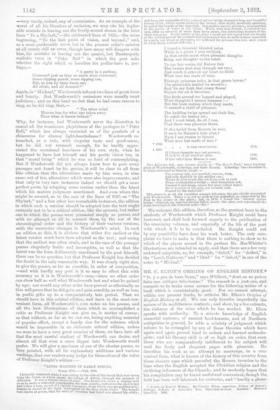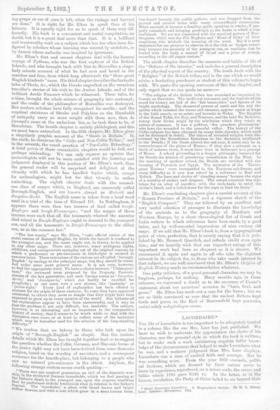MR. C. ELTON'S ORIGINS OF ENGLISH HISTORY.* " IL y
a pen de bons livres," says D'Olivot, " dont on ne puisse faire une critique tics-bonne." The remark is a just one, and compels us to make some excuse for the following notice of a book which is unmistakably good. For we cannot attempt, within our present limits, to criticise Mr. Elton's Origins of English, History at all. We can only describe imperfectly the nature of its multifarious contents ; and show, by a few extracts, the richness of the mine which he has worked. Mr. Elton speaks with authority. To a minute knowledge of English manorial customs, of ancient laud-tenures, and of Northern antiquities in general, he adds a sobriety of judgment which refuses to be entangled by any of those theories which have again and again proved fatal to ardent and learned archaeolo- gists; and his literary skill is of so high an order, that even those who are comparatively indifferent to his subject will read his lively and eloquent pages with pleasure. He describes his work as au attempt to rearrange, in a con- venient form, what is known of the history of this country from those obscure ages which preceded the Roman invasion to the time when the English accepted the Christian religion and the civilising influences of the Church ; and he modestly hopes that his compilation may be found useful and convenient, though the field has been well laboured. for centuries, and "hardly a glean- * Origins of English History. By Charles Elton, sometime Fellow of Queen's College, Oxford, of Lincoln's Inn, Barrister-at-Law, London; Bernard Quatrtch. 1882. ing-grape or ear of corn is left, when the vintage and harvest are done." It,is right for Mr. Elton to speak thus of his labours. It is equally right for us to speak of them very dif- ferently. His book is a convenient and useful compilation, no doubt, but it is a great deal more than that. It is a brilliant and trustworthy work ou a subject which has too often been dis- figured by scholars whose learning was marred by crotchets, or by dunces whose audacity was inspired by ignorance. Mr. Elton's first and second chapters deal with the famous voyage of Pythons, who was the first explorer of the British Islands, and who brought back with him to Marseilles a singu- larly minute account of what he had seen and heard in the marshes and fens, from which long afterwards the " three great English kindreds " came. His third chapter describes the fantastic tales of Thule, &c., which the Greeks engrafted on the veracious traveller's stories of his visit to the Amber Islands, and of the brilliant Arctic Summer which he witnessed. These tales, for a time, brought the whole science of geography into contempt ; and the credit of the philosopher of Marseilles was destroyed. But modern scholars have fully recognised his merits ; and the sceptical strictures of Strabo and Polybius on the Humboldt of antiquity carry no more weight with them now, than do Juvenal's sneer at the audacious lies, as he took them to be, of Herodotus. The fourth chapter is mainly philological, and this we must leave untouched. In the fifth chapter, Mr. Elton gives a singularly graphic account of the " Gauls in Britain." In the sixth, he discusses the " Celts and Non-Celtic Tribes ;" and in the seventh, the vexed question of " Pre-Celtic Ethnology.' A brief pr6cis of these remarkable chapters would be dull, and perhaps misleading. We can only express an opinion that archmologists will not be more satisfied with the learning and judgment displayed in this portion of Mr. Elton's work, than the general reader will be surprised and delighted at the vivacity with which he has handled topics which, except for archaeologists, might but for that vivacity be rather uninviting. The eighth chapter deals with the anomal- ous class of usages which, in England, are commonly called Borough-English, and are known, abroad as Mainete and Tungsten-Becht. The English name is taken from a local word used in a trial of -the time of Edward III, In Nottingham, it appears there were then two tenures of land called burgh- Engloyes and burgle-Frauncoyes; "and the usages of those tenures were such that all the tenements whereof the ancestor died seized in Burgh-Engloyes ought to descend to the youngest son, and all the tenements in Burgh-Frauncoyes to the eldest son, as at the common law."
"The law courts," says Mr. Elton, " take official notice of the strict custom of Borough-English, by which the benefit is confined to the youngest son, and the name ought not, in theory, to be applied to any other usage. There are, however, many analogous rights, additions, and enlargements springing out of the original custom, by which a preference or pre-eminence in birth-right is secured to remoter heirs. These extensions of the custom are all called borough- English ' by analogy to the principal usage, but they should be classi- fied under some more general name. It is not easy, however, to find the appropriate word. We have a choice between Ultimogani- tu. re," the awkward term proposed by the Property Commis- sioners of the last generation, and such foreign terms as Tungsten- Recht,' and Juveignerio,' which can hardly be excelled for simplicity; or one must coin a now phrase, like juniority ' or
junior-right.' Every kind of explanation has been offered to account for the origin of these customs. To some they have appeared unnatural, to others they seem so simple that they might have been expected to grow up in every quarter of the world. But hitherto all the explanations appear to have been unsuccessful, and it may be that the problem is not only difficult, but insoluble. The subject, however, is so interesting and so important to the comparative history of society, that it seems to be worth while to . deal with the discussion once more, or at least to collect some of the 'materials which may be hereafter used for the solution of the long-standing difficulty."
" We confess that we belong to those who look upon the origin of " Borough-English " as simple. But the curious details which Mr. Elton has brought together lead us to suggest the question whether the Celtic, German, and Slavonic forms of the junior right may not have been derived from some domestic religion, based on the worship of ancestors, and a consequent reverence for the hearth-place, but belonging to a people who saw no natural pre-eminence in the eldest. Anyhow, the following strange custom seems worth quoting :- "There T.here was one magical possession, an idol of the domestic wor- ship, in the medicoval German households, which we find passing at t.. etfather's death to the youngest son, upon the express condition that he performed certain heathenish rites in relation to the father's funeral. The ' mandrake,' a plant with broad leaves and bright yellow flowers, and with a root which grew in a, semi-human form,
was found beneath the public gallows, and was dragged from the ground and carried home with many extraordinary ceremonies. When secured, it became a familiar spirit, speaking in oracles, if pro- perly consulted, and bringing good-luck to the house in which it was enshrined. We are-not concerned with the mystical powers of Man- dragoras, which was the IMe Magloire and Hand of Glory' of later magicians, who mistook the meaning of the word. But it is very important for our purpose to observe that the idol, or Galgen-miluu. lein,' became the property of the youngest son, on condition that ho buried with the body a morsel of bread and a piece of money, according to the old pagan custom."
The ninth chapter describes the manners and habits of life of the "Britons of the interior," and includes a general description of the physical aspect of the country. The tenth deals with the " Religion " of the British tribes, and is the one which we would advise a hesitating purchaser or student of this volume to begin with. We quote the opening sentences of this fine chapter, and only regret that we can quote no more ;—
"The religion of the British tribes has exercised an important in- fluence on literature. The niedifeval romances and the legends which stood for history are full of the fair humanities' and figures of its bright mythology. The elemental powers of earth and fire, and tho spirits which haunted the waves and streams, appear again as kings in the Irish annals, or as saints and hermits in Wales. The Knights of the Round Table, Sir Kay, and Tristram, and the bold Sir Bedivere, betray their divine origin by the attributes which they retain as heroes of romance. It was a goddess, dea quaedam phantastica,' who bore the wounded to the peaceful valley. The history of the Celtic religion has been obscured by many false theories, which need not be discussed in detail. The traces of revealed religion were dis- covered by the Benedictine historians in the doctrines attributed to the Druids ; if the Gauls adored the oak-tree, it could only be in
remembrance of the plains of Mainre ; if they slew a prisoner ou a block of unhe wn stone, it must have been in deference to a precept of Moses. A. school pretending to a deeper philosophy invented for the Druids the mission of preserving monotheism in the West. In the teaching of another school, the Druids are credited with the learning of Phoenicia and Egypt, The mysteries of the ` Thrice- great Hermes' were transported to the Northern oak-forests, and every difficulty as it rose was solved by a reference to Baal and Moloch. The lines and circles of standing-stones' became the signs of a worship of snakes and dragons. The raised cromlech was mis- taken for an altar of sacrifice, with the rock-basin to catch the victim's blood, and a holed-stone for the_rope to bind his limbs."
Mr. Elton's concluding chapters give a careful account of the " Roman Province of Britain," and a vigorous sketch of the "English Conquest." They are followed by an excellent and very useful selection of passages to illustrate the knowledge of the ancients as to the geography of Northern and Western Europe, by a short chronological list of Greek and Latin writers to which references have been made, by a good index, and by well-executed impressions of nine curious old maps. If we add that Mr. Eltou's book is, from a typographical point of view, perfection, that is merely saying that it is pub- lished by Mr. Bernard Quaritch, and reflects credit even upon him ; and we heartily wish that our imperfect eulogy of this important work had been as eloquent as it is sincere. We recommend it again and again to all who take the slightest interest in its 'subject, for, to those who take much interest in that subject, we are well convinced that Mr. Elton's Origins of English History needs no recommendation whatever.
One petty criticism, of a quasi-personal character, we may be forgiven, perhaps, for making. Many mouths ago, in these columns, we expressed a doubt as to the accuracy of Caesar's statement about our ancestors' aversion to "hare, fowl, and goose." Mr. Elton has made out a case for the hares ; but we are as little convinced as ever that the ancient Britons kept fowls and geese, as the Earl of Beaconsfield kept peacocks,
aninii, solely voluptatisque cause.































 Previous page
Previous page